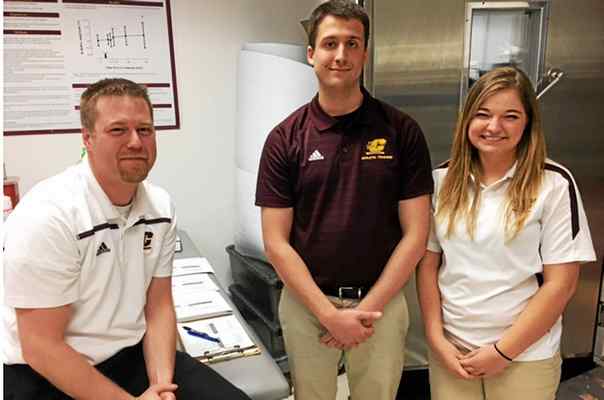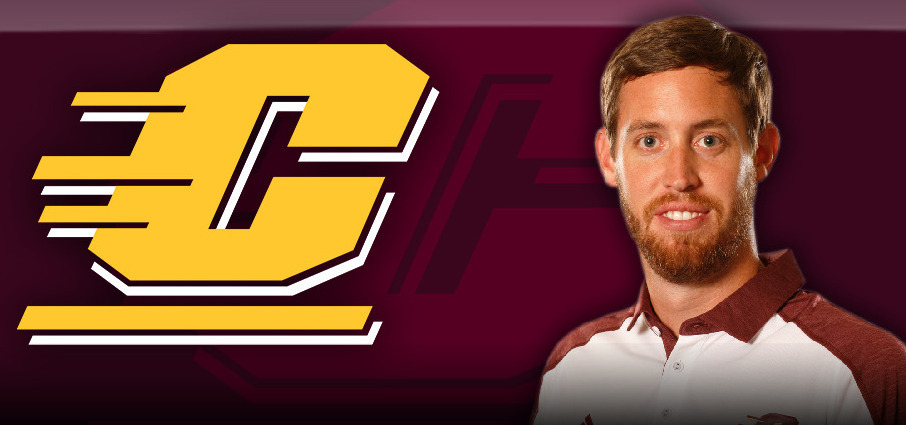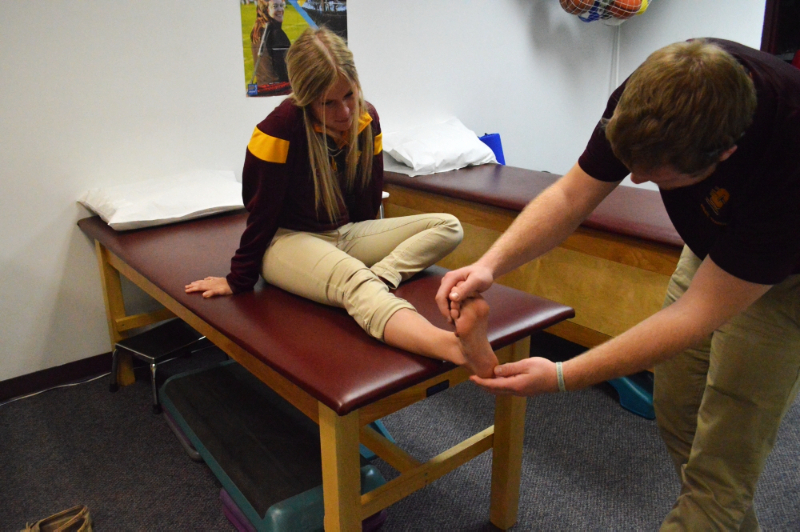
Article reposted from Morning Sun News
Author: CMU Public Relations
These are words that could end a young life.
Yes, a football player suffering heat exhaustion will feel a lot better after a 30-minute break, but if he’s still in uniform and pads, the athlete actually is cooking inside his gear and is closer to death than he or his coach may realize.
That’s what two juniors in Central Michigan University’s athletic training program — Grace Katt of South Haven and Tim Di Mango of Milford — found during an award-winning research project.
“You have cell death. You can have organ failure, and that’s what ultimately leads to death,” Katt said.
Their work won the Best Original Research Award at the Great Lakes Athletic Trainers Association’s annual meeting this year in Chicago. It’s no small honor: GLATA is the largest regional sports medicine conference in the country.
Kevin Miller, a CMU rehabilitation and medical sciences faculty member, oversaw the project.
Katt and Di Mango keyed on football players, who are particularly prone to heat exhaustion — especially with practices about to start under a scorching sun.
So, what’s a coach or an athletic trainer to do? Have a tub of cold water on hand, and get the player immersed ASAP. Fifty degrees or so is just fine, Miller said.
And at this stage, don’t worry about the uniform and pads. The cold water still cools the athlete quickly, and stripping down the player before the plunge wastes valuable time.
“How long you stay too hot determines whether you live or die,” Miller said.
Ten male volunteers, all physically active and in full football gear, ran on a treadmill until they reached body temperatures of about 103.5 degrees Fahrenheit or showed signs of agitation, sickness or loss of body control, Di Mango said.
The subjects then were immersed in a tub of water after delays of five and 30 minutes — on different days — and their core temperatures and cooling rates were monitored.
At no point were the volunteers in any danger. Miller said exertional heat stroke usually occurs at a body temperature over 105 degrees.
“We bring them as close as we can — safely,” he said.
Katt said she and Di Mango based their study on three questions: What happens to body temperature when treatment is delayed for football players in full uniform? Is cold water immersion still effective after the delay? What are the athletes’ perceptions before and after the exercise and during immersion?
The cooling rate was the same after 30 minutes as it was after five, the students found, and immersion still worked.
However, they also learned that while the athletes still felt terrible after the five-minute wait, they reported feeling much better after a half hour.
But they weren’t better.
“We need to rely on things like rectal thermometry instead of asking an athete how they’re feeling,” Katt said, “because they’re not able to accurately tell what their core body temperature is.”
That’s especially important for athletic trainers who move from one practice field to another and can only guess the amount of time a player has been overheated, she said.
Miller was impressed.
“Grace and Tim have done a fantastic job,” he said. “They are really pushing the profession of athletic training forward with this research.”
Miller said CMU is one of the rare schools that offers such opportunities to undergraduates. Original research usually is reserved for master’s and doctoral candidates.
“We tell our students, ‘We’re here to help you go as far as you want,’” he said. “So if they want to present research at a national meeting or a regional meeting, we can help them do that.
“And so far all of those students have taken me up on those opportunities. They go to these conferences, and they represent CMU very well.”

